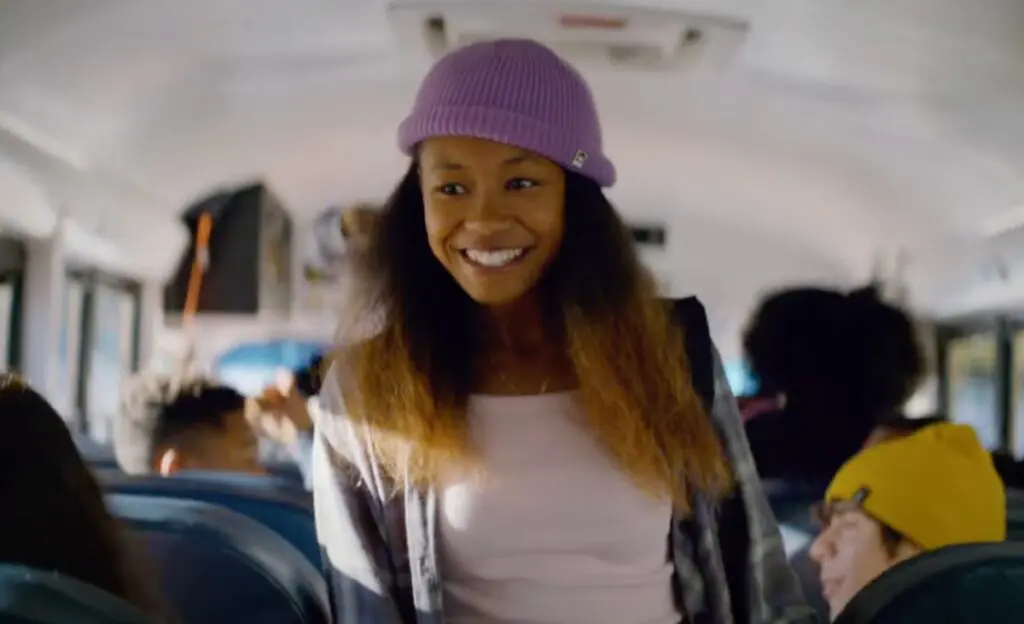Summary
On the Come Up has an authentic voice reverberating throughout the picture.
This review of the Paramount+ film On the Come Up does not contain spoilers.
On the Come Up focuses its story on Bri (Jamila Gray), an aspiring rapper who lives in the shadow of her dead father. He was a legendary figure around the Garden Heights area. Bri wears his chain daily, her last memory of a great local rapper who died too young. She also carries haunting images of her mother, Jay (Sanaa Lathan, pulling double duty behind the camera), leaving her alone and being controlled by her heroin use. Now clean, Jay has trouble finding work because no one wants to hire her because of her past. The family, including her brother, Trey (The Rookie’s Titus Makin Jr), is at risk of becoming homeless. They are behind on their rent, the water is now as cold as an unforgiving world, and the electricity is turned off.
What possibly can a teenage girl do? That’s where her aunt Pooh (a terrific Da’Vine Joy Randolph) comes in. She thinks if Bri can get discovered at the battle, she can get signed to a contract for a lot of money. However, she quit because they attacked her family. Bri, though, rebounds and destroys a rapper who made it, managed by Supreme (Method Man), a successful music manager who lives in a fancy white house and has eyes on stealing Pooh’s best chance at leaving her life in Garden Heights behind.
On the Come Up is based on the book by Angie Thomas, who wrote the acclaimed book The Hate U Give, adapted into a well-received film in 2018. Working from an adaptation from Kay Oyegun (This is Us), Lathan keeps some of the same themes in Thomas’s work. This is important since the source material is set in the same area of both worlds, Garden Heights. The script is layered with themes of racism, authority overreach, and, most importantly, stereotypes, particularly the forcing of people of color into a typecast box by a lily-white world.
It’s mainly looked at from a mesosystem’s perspective. For example, Bri experiences an assault by school-paid security guards. They overstep their authority by going through her bag. The guards even rip it from her hands and slam her to the ground. The school principal suspends her and all her actions. This includes the school superintendent, whose only interest is protecting themselves from lawsuits. When Supreme uses his position of power to make Bri record a song that will “scare white kid’s parents” into a stereotype that has nothing to do with her experience, the song reverberates around the community. This sparks white parents to demand Bri be given a permanent suspension.
This couples this with some powerful images from Lathan’s lens, one that evokes the type of past that gives you a perspective many are unfamiliar with. There’s an image many may have missed. When Bri runs away from her mother as a small child, she comes upon a mural. If you look closely, it depicts a legend wearing the same chain Bri wore as a teenager. There’s a community shared history, including trauma and oppression. What the script does so well is showing how Bri is informing her rap lyrics. Every time she comes across an experience or observation she appreciates, Oyegun’s writing allows the viewer to, at the very least, learn how she hones her craft. This storytelling device evokes emotions unique to a subculture that many will never understand.
On the Come Up is semi-autobiographical. Thomas draws upon her experiences and dreams of becoming a rapper as a teenager. Anyone looking for this film to be The Hate U Give will notice some significant differences. The latter drew upon a large amount of supercharging emotion because of the raw subject matter. The difference here is that Lathan’s film has a stoic quality of despair. This pairs well with strong performances from Jamilia Gray and Sanaa Lathan. As well as Dolemite Is My Name‘s Randolph, giving the film’s breakout turn as Pooh. Her spin on the role gives the film the juice it sorely needed.
Where On the Come Up falls short is emphasizing Bri’s lyrics from the source material; it would have worked better if she drew upon multiple experiences that drew outrage from a white community, not just one. This would have been a stronger film if this addition took place throughout the picture. However, the final product is a rousing success, an equivalent to many rags-to-riches tales or nobody-to-somebody films, with the exception here being the grand prize is a young African American woman finding her authentic voice.
Which is worth more than money.
READ – will there be a sequel to On the Come Up?
READ – where was On the Come Up filmed?
READ – the ending explained for On the Come Up.
READ – 10 films like On the Come Up.
READ – Best and Highest Rated Musical Movies with Original Songs
What did you think of On the Come Up? Comment below.



